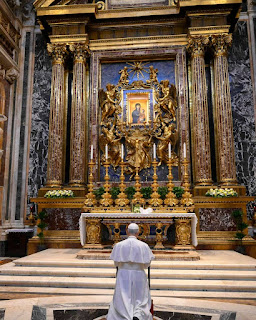Subtitle:
From Cardinal Sarah's fabricated appointment to conspiracy theories about Bishop Paglia, a new wave of disinformation targets the Vatican. But just as Leo the Great stopped Attila, Leo XIV is ready to face today's conspiratorial storm.
Pope Leo XIV had barely stepped into the papal office when the first wave of coordinated disinformation began crashing against the Vatican's gates. In recent days, a completely false story has gone viral on social media—and even some online news outlets: the alleged appointment of Cardinal Robert Sarah as a "Special Papal Envoy for the Global South," a title described as unprecedented in Church history and supposedly granting him diplomatic powers in conflict zones. A dramatic claim—yet entirely made up.
The first red flags were obvious: sensationalist headlines and a vague description of the role assigned to Cardinal Sarah. According to the false reports, this new position would allow him to represent the Pope in "sensitive missions" around the world, particularly in developing nations. And yet, the only official source for Vatican appointments—the Holy See's daily bulletin—contained not a single reference to such a post. No announcement, no statement, nothing at all.
The final word came from Cardinal Sarah himself, who firmly dismissed the story. In an interview with La Nuova Bussola Quotidiana, he didn't mince words: "What does 'Special Envoy for the Global South' even mean? That role doesn't exist. It's disrespectful toward the Holy Father to attribute such nonsense to him." His response put an end to the speculation, exposing the claim for what it was: a fake news item crafted to confuse and manipulate.
But the Sarah story wasn't an isolated case. Just days later, social media lit up again—this time with false claims about Cardinal Vincenzo Paglia being "purged" from his position. In reality, Paglia simply retired upon reaching the age limit established by canon law. Still, this ordinary transition was twisted into another piece of "evidence" that Pope Leo XIV was allegedly cleansing the Church of dissenting voices. Once again, conspiracy theories gained traction, mostly among fringe groups and ideological echo chambers.
What's the common thread? Pope Leo XIV himself. The main target of both attacks is clearly the newly elected pontiff. And the origin of much of the disinformation appears to lie in ultra-conservative circles—especially in the U.S.—aligned with far-right ideologies. This isn't the first time a pope has faced attacks from these quarters: similar waves of criticism were aimed at Popes John Paul II, Benedict XVI, and especially Francis. But this time, the offensive seems particularly swift, calculated, and ideologically driven.
This is nothing less than an information war. And like all wars, it has its weapons: viral memes, misleading headlines, doctored quotes, clickbait articles. The goal isn't just to discredit Pope Leo XIV personally, but to undermine his moral authority and stall his agenda before it even begins. The new pope has already shown a desire to address urgent global issues—social justice, peacebuilding, environmental stewardship—with fresh energy and a global vision. These themes make certain factions nervous, particularly those who have politicized religion in recent years.
In this light, the comparison with Pope Leo the Great—who confronted Attila the Hun with only the strength of his words—is more than symbolic. Pope Leo XIV now faces a new kind of invader: not a warlord on horseback, but an algorithm-powered flood of fake news, propaganda, and polarizing narratives. The threat is different, but no less real. And the defense of truth is just as crucial.
The Vatican must not rely on silence alone. Catholic media, Church institutions, and well-informed believers need to step up. Combating disinformation requires swift fact-checking, transparent communication, and proactive education. In an era where speed often trumps accuracy, discernment is no longer just a virtue—it's an ethical responsibility.
In conclusion, these early attacks against Pope Leo XIV should not be dismissed as noise. They are warning signs that a segment of the global political and religious landscape is preparing for battle. A battle not of theology, but of narratives, influence, and perception. Yet Leo XIV, with his clarity of vision and pastoral depth, is more than capable of meeting the challenge.
If "the truth will set you free," as the Gospel reminds us, then truth is Pope Leo XIV's most powerful weapon. And he will need it—not just to defend his pontificate, but to protect the Church's mission in a world awash in digital deception.
Marco Baratto (opinionist)



Nessun commento:
Posta un commento